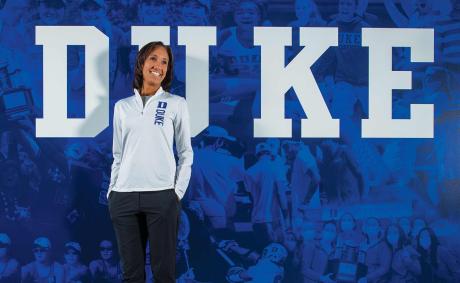Students in freshman orientation need to bond, to create their first Duke families – to stretch and begin embracing the tide of changes and complexities roaring their way. So, the directors of Project Change, an experiential orientation program, get their attention in a hurry.
“They take our phone for, like, the entire day,” says Maya Chandar, from Fort Myers, Florida, who thinks she might major in artificial intelligence and neuroscience. “Which has fostered community. You’re spending 16 hours a day together. It’s like summer camp, glorified.”

Project Change is one of 18 weeklong experiential orientation programs that this year included every Duke freshman. In recent years Project Change and similar opportunities were pre-orientation programs, but according to Grace Sullivan Zirkle, associate director of new student and family programs, the benefits of the programs were too vast not to share. Students who participated in pre-orientation programs ended up feeling a stronger connection to Duke and simply doing better.
“Two of those indicators that helped us move to this program were higher GPAs and [students were] more likely to have leadership positions on campus,” she said of program participants. Given that many pre-orientation programs had additional costs, skewing the benefits toward those who could afford them, administrators were especially glad to take the equity-driven step of including all students.
“I didn’t really know just how involved Duke was in racial segregation.”
-- Harry Fazzone, Project Change participant
This orientation features 18 programs, ranging all over the Duke landscape. Project Media students become acquainted with various storytelling methods by meeting with communicators on campus, while Project Earth introduces students to the Duke Farm and other aspects of sustainability.
And Project Change, one of the oldest programs and run through the Kenan Institute for Ethics, introduces Duke students to both the rich world of Durham and the complexity of making actual social change. “I wanted to create the pre-orientation program that I wished I had had when I was a Duke student,” says Ada Gregory ’92, A.M. ’04, associate director of the Kenan Institute. Gregory took a while to find her connections at Duke. She found support for some of her goals through Durham connections rather than at Duke, so Project Change addresses both of those issues. The first day of the program, for example, is a scavenger hunt throughout Durham.

“The other piece,” she says, “was really about orienting students in such a way that they thought about how they could be changemakers in the world and approach their Duke experience a little bit with the sense of ‘How can I think about these things in a little more complex way?’”
That is, many students enter Duke with simplistic ideas about making change in the world. Project Change, in some ways, teaches them how to fail – or at least how complex change can be and how long it takes. This year’s focus developed from Gregory’s discovery that the deed to her home had a restrictive racial covenant. Though unenforceable, the covenant horrified her, and she involved the students in an enterprise to work through removing such covenants from current properties, knocking on doors near Duke Forest and doing research in files.
“There’s a lot of systemic issues going on,” Chandar says her group quickly learned.
Adds Harry Fazzone, a possible computer science major from Albany, New York: “I didn’t really know just how involved Duke was in racial segregation.”
Sara Abusulb, a possible biology major from St. Petersburg, Florida, appreciates the fellowship of the program. “Being with these people for an extended time, all from different places, we connected through music, or where we came from. In some fundamental way we are all sharing the same transition.”
Christian Ferney AM’05, Ph.D.’09, a Kenan program director, notes that “one of our students [was] still here hunting for deeds with racial covenants in the West Duke Building while others [were] out canvassing. Part of what we hope will happen is that students will get so into the project that they want to keep up with it even once the artificial deadline of Orientation Week starts to fade. That’s clearly happening.”




